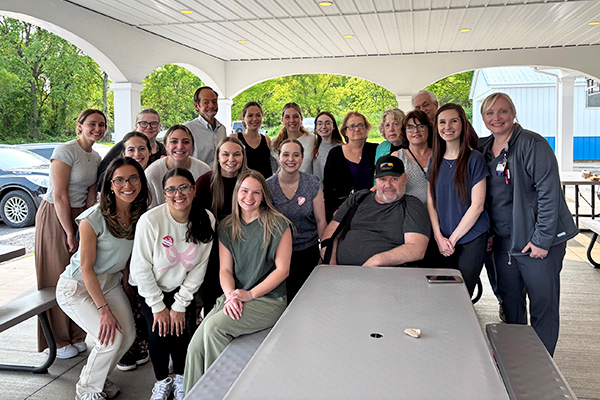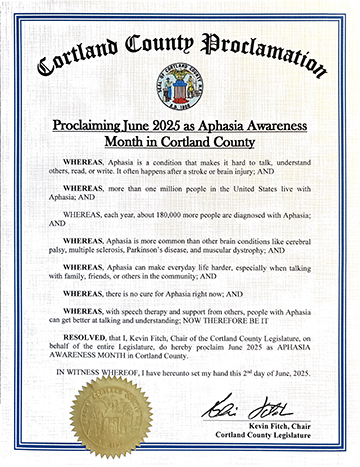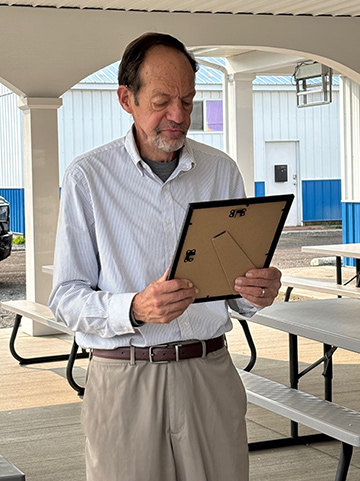
06/24/2025
For eight years, June has been “Aphasia Awareness Month” in Cortland County. Each time, lecturer Eileen Gilroy of SUNY Cortland’s Communication Disorders and Sciences Department has been the force that gets the often-unknown medical condition the attention it deserves.
And in what’s become a rewarding summer tradition, a naming ceremony held at a local ice cream shop lets her students sit with an aphasia support group and hear their stories of struggle and recovery.
“It’s a nice learning atmosphere and it’s a good way to show the students that life goes on,” Gilroy said. “People live with aphasia and maybe they’re communicating a little differently or have some challenges, but they are able to still interact and socialize and have fun.”
Aphasia is a language disorder that affects the ability to speak and understand what others say and can also impact reading or writing comprehension. The National Aphasia Association estimates at least 2 million Americans have the condition, including one-third of stroke victims.

The proclamation, advocated for by Gilroy and her students, began in 2017 as an announcement made during a County Legislature meeting. It coincides with June being National Aphasia Awareness Month.
After that early work by her class, county officials decided three years ago to bring the event into the community. Since then, it’s been held at Super Cream Dairy Barn in nearby Homer. That change meant a chance for Friends of Aphasia to become a part of the process, bringing SUNY Cortland’s students together casually with some of the people they worked with in the university’s Center for Speech, Language and Hearing Disorders.
Gilroy and friend Michele Chisholm Clukey ’14, M ’16, a speech pathologist at Guthrie Cortland Medical Center, help lead Friends of Aphasia, which meets quarterly and welcomes people with aphasia, their caregivers, and anyone with an interest in the condition.
“Some students have worked with individuals with aphasia that come to our clinic for speech therapy,” Gilroy said. “So for those students it allows them to connect with their client in a more social environment and joke with them and laugh with them and see how they carry over the skills that they worked on in our clinic into real life. ... Those are the types of things that really bridge communication skills into functional community-based communication.”
Graduate student Lauren Crandall ’16 said she was moved by the personal stories she heard.
“In the clinic, our focus is often on specific goals and structured tasks, so this event was a rare and meaningful opportunity to simply sit, listen and engage in conversations about life with aphasia. I was especially thrilled to see my client from the Fall 2025 semester and to hear about the progress he has made since our time together.”
Margaret Horn ’24, another graduate student who was at the event, agreed.
“While we learn all about the impacts, and we do see the population in the clinic, it was a much more intimate experience to sit down and eat ice cream with stroke survivors,” Horn said. “We gained more of an idea of what their life is like when they leave our 45-minute therapy appointment.”

County Legislator Doug Bentley, who has read the official proclamation the past three years, has direct knowledge of how difficulties in speech can change a life. In 2016, Bentley had tongue surgery that removed the right half of his tongue, replacing it with skin from his right wrist.
Bentley, who has been a legislator for eight years, noted he did not have aphasia, but he has had trouble with his speech since the operation.
“I rarely speak during meetings for fear of being misunderstood,” Bentley said. “It takes a bit of patience to listen carefully and understand what I say. If my car breaks down and I call AAA emergency road service, the robot operator can never figure out what city I am in. When I order food in a restaurant, I get a quizzical look from the waitress. The drive thru at a fast-food place does not work for me — ever.”
Gilroy described him as a strong proponent of Friends of Aphasia and someone who has had success in the university’s speech therapy program. After Bentley was a guest lecturer at SUNY Cortland in 2022, he signed up for treatment.
“We had maybe a dozen weekly sessions during which I was encouraged to speak with intention, pump up my volume and carefully exaggerate my articulation,” Bentley said. “My speech began to improve. In the spring of 2024 I was invited back. They paired me up with a different grad student and we met each week to reinforce good speaking habits. Last month, I finished my third semester at the speech clinic. I often am told that my speech has become easier to understand.”
Now, after their experience with Bentley and others, Gilroy said her students will move on to classes the next two semesters that place them in offsite training, alternating between local schools and hospitals.
Similar to the experience of enjoying ice cream with the Friends of Aphasia, she noted it was a valuable aid to students’ future careers to get a wide-ranging feel for their patients' lives.
“There’s an approach in our treatment called life participation, so I really wanted them to get a sense of advocacy for individuals with aphasia and learn that if we're going to be providing speech therapy for them,” Gilroy said. “That isn’t just coming to see us and punching a ticket.
“We have to be their advocates. We have to help design their individual therapy speech therapy plan around what they need and what they want and how what their needs are to communicate in the real world.”